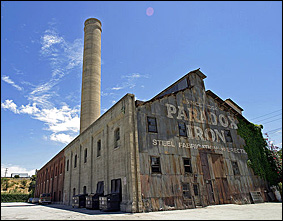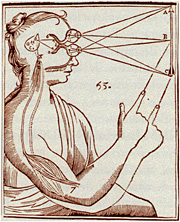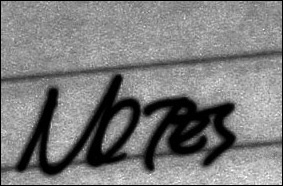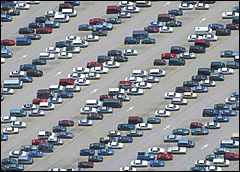Of Artists and Entrepreneurs
Saturday, September 2nd, 2006I had lunch with a friend today who, like me, went through the art school mill and now teaches at a university. He came to talk about a business idea that he had been working on. We noted that business in general and entrepreneurship in particular were variously ignored, frowned upon, or downright despised in contemporary art circles. Of course this is complete bullshit. Art itself is a business - one with it’’s own peculiar and quite elitist economy - and artists spend a good deal of time pretending that it is not a business.
 The denial is wrapped up in the whole mentality of being a modern or contemporary artist. Get your MFA, work some crap gig, and live in a dirty, dangerous urban environment, preferably an industrial park. I did it for a year or so in the
The denial is wrapped up in the whole mentality of being a modern or contemporary artist. Get your MFA, work some crap gig, and live in a dirty, dangerous urban environment, preferably an industrial park. I did it for a year or so in the
early 1990’s in downtown Los Angeles and then discovered the beautiful canyons
of Sierra Madre. It didn’t take much to burn down that mythological house. Living in squalor did not give me the warm fuzzies. I had enough grime, chaos, and noise in my own head and didn’t need the inner city to make me feel “authentic”or “connected.”
Early on, I too had the view of business that it was just evil, pointless, greed driven piggishness - and sure, much of it is. During the 1990’s when I ran a serious of businesses I often had the feeling of my soul draining to the floor as I sat in a meeting, a visceral feel of time slipping by in the wake of crushing meaninglesness. But at least I could sit down while my soul drained away. At art openings they make you stand up.
But as with so many things, I hated what I didn’t understand.
What I learned is that the same processes involved in “creating” in the fine arts are present everywhere in society, including and most especially in entrepreneurship. Many of the fine artists I have known are totally spineless. They are beholden to a power structure - critics, curators, collectors (the 3 C’s) - that they rarely question. The fakery is no less thick than the most tasteless marketing pitch from a mattress company. The difference is that business lies right to your face while art pretends it isn’t lying.
I’m completely devoted to the creative life, but I have learned not to restrict it out of ignorance to things traditionally labeled “the arts.” It’s everywhere. That feeling of wanting to create something new is the same whether it’s a film, a recording, a virtual island, or a start-up. You just begin with different constraints, established methods, and expectations.
After being burnt out from the dot-com era, over the past year I’ve been feeling more and more like there may be another run to make. Creating a business requires you to bounce your ideas against the unbending nature of physical reality. Of practical, economic reality. It requires you to use the materials of real time, real people, and to create something that works in the face of enormous uncertainties. This is especially true in technology where the ground is shifting beneath you constantly. It is exactly like studying metaphysics, or painting.
 Hopefully a lot of the way people in the arts view entrepreneurship will change. There are signs. The fact that you can build your own network and market yourself
Hopefully a lot of the way people in the arts view entrepreneurship will change. There are signs. The fact that you can build your own network and market yourself
with various Internet strategies is a major change. It’s an unstable and evolving scenario, but the “long tail” effect is a real one, and the opportunities for a significant level of creative independence for artists with a strong, personal , authentic voice are promising.
Yes, it’s easier to give your cultural product to “the man” - music label, gallery, publisher, etc. - and then let them market and distribute while you stay completely in the dark about the process. But the ability to control the entire enterprise is much more empowering, interesting, and liberating. The whole idea about “marketing yourself” changes from fake cheek kiss networking with those who would present you to the world to using distributed networks on the web to connect directly to an audience.
My friend thought up a way to make money from the backwardness of the art system. I wish him the best in his entrepreneurial and yes, creative endeavor.
 After looking at fifty or sixty homes, we found one. (Remember, when you are looking, its a home, when you are selling, its a house; one is a place, the other a property. This distinction is supposed to provide the proper emotional distance depending on your situation).
After looking at fifty or sixty homes, we found one. (Remember, when you are looking, its a home, when you are selling, its a house; one is a place, the other a property. This distinction is supposed to provide the proper emotional distance depending on your situation). I live in the 21st century with it’s blistering pace and always on culture, but in some places like state and city offices and credit reporting companies I have to slow to an aching crawl, search for things with my hands, and savor the adhesive glue on my tongue while waiting for weeks for a piece of paper to arrive from some musty beige filing cabinet in Norwalk California.
I live in the 21st century with it’s blistering pace and always on culture, but in some places like state and city offices and credit reporting companies I have to slow to an aching crawl, search for things with my hands, and savor the adhesive glue on my tongue while waiting for weeks for a piece of paper to arrive from some musty beige filing cabinet in Norwalk California. It comes as no surprise that Americans are under severe stress due to crushing debt levels and a savings rate that is basically zero. It’s not surprising because we are encouraged to over-consume by nearly every facet of culture and media. Worse, we have internalized consumerism to the point where it has become our value system.
It comes as no surprise that Americans are under severe stress due to crushing debt levels and a savings rate that is basically zero. It’s not surprising because we are encouraged to over-consume by nearly every facet of culture and media. Worse, we have internalized consumerism to the point where it has become our value system.